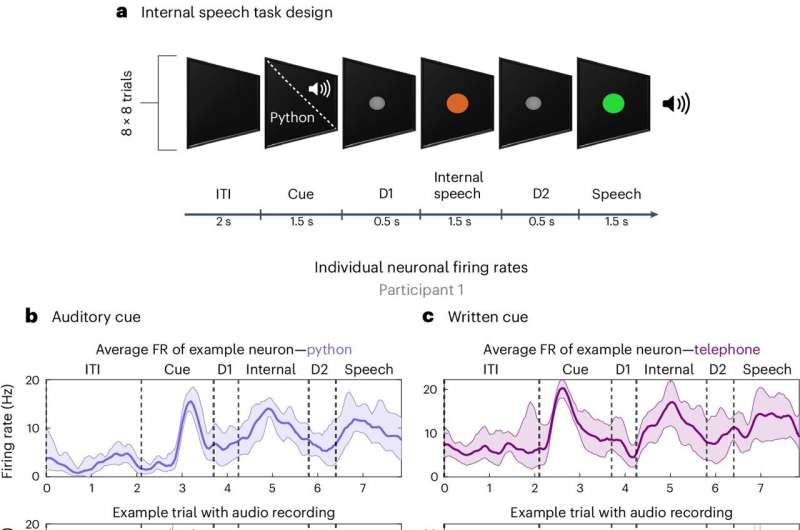This article has been reviewed according to Science X's editorial process and policies. Editors have highlighted the following attributes while ensuring the content's credibility:
fact-checked
peer-reviewed publication
trusted source
proofread

A team of brain specialists at the California Institute of Technology has developed a brain–computer interface (BCI) approach to decode words "spoken" entirely in the brain by recording signals from individual neurons in real time—a first.
In their study, reported in the journal Nature Human Behavior, the group implanted probes in the supramarginal gyrus, a region of the brain never before tested with BCI technology.
The editors at Nature Human Behavior have also published a Research Briefing in the same journal issue outlining the work by the group.
Over the past several decades, scientists have been developing technology to read a person's thoughts and convert them to printed words on a computer screen. Such work has led to the development of BCI technology, albeit with limited abilities. Some technologies could recognize words, for example, but most were used in conjunction with trained speech interpreters and were tested in individuals who were also speaking.
For this new study, the research team has moved the needle slightly by testing BCI technology on a different part of the brain; they were able to decode a few words that were "spoken" only in the brain.
The work involved placing electrodes into the brains of two volunteers with spinal cord injuries. The electrodes were implanted in the supramarginal gyrus, a part of the brain that recent research suggests is involved in subvocal speech.
After allowing the patients to heal for two weeks, the researchers began collecting data for the BCI, which had already been trained to recognize brain signals for six test words, along with two words that had no meaning, to serve as a control. The volunteers were then asked several times to imagine speaking the words as they were displayed on a computer screen while signals from their brains were decoded.
The research team found that they were able to decode the words for one patient with 79% accuracy and 23% for the other. Both efforts were considered a success, though the researchers were not able to explain why they found such a wide difference in the volunteers.
More information: Sarah K. Wandelt et al, Representation of internal speech by single neurons in human supramarginal gyrus, Nature Human Behaviour (2024). DOI: 10.1038/s41562-024-01867-y
Brain–machine-interface device translates internal speech into text, Nature Human Behaviour (2024). DOI: 10.1038/s41562-024-01869-w
© 2024 Science X Network
Citation: Brain–computer interface experiments first to decode words 'spoken' entirely in the brain in real time (2024, May 14) retrieved 14 May 2024 from https://ift.tt/53Egd0A
This document is subject to copyright. Apart from any fair dealing for the purpose of private study or research, no part may be reproduced without the written permission. The content is provided for information purposes only.
Explore further
"interface" - Google News
May 14, 2024 at 08:35PM
https://ift.tt/u1aZRez
Brain–computer interface experiments first to decode words 'spoken' entirely in the brain in real time - Medical Xpress
"interface" - Google News
https://ift.tt/Uo6AiHG
https://ift.tt/dzb8ORI
Bagikan Berita Ini














0 Response to "Brain–computer interface experiments first to decode words 'spoken' entirely in the brain in real time - Medical Xpress"
Post a Comment